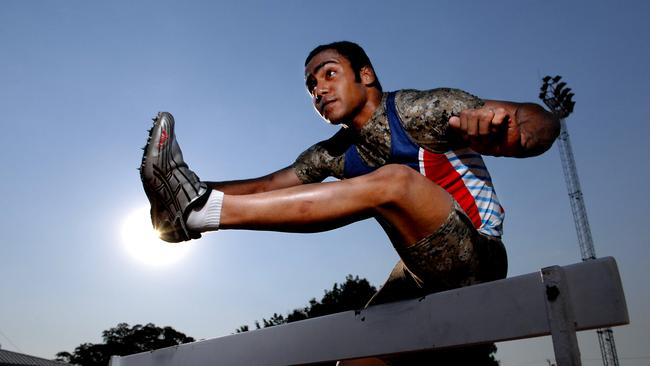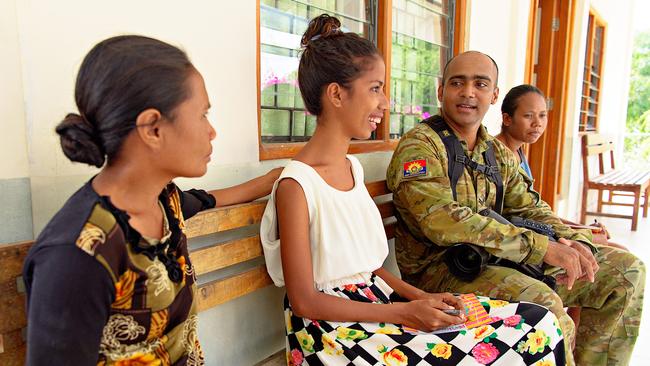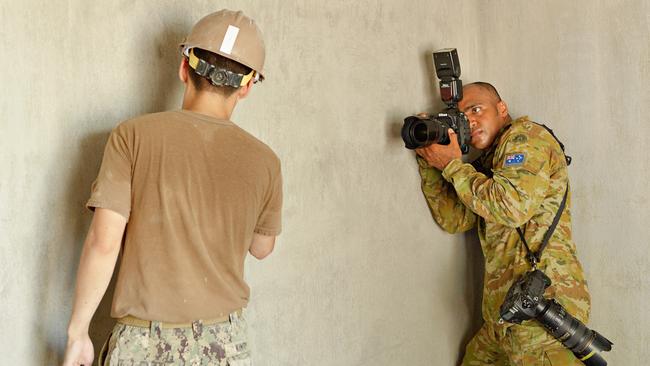He arrived in Australia as a scared child fleeing a country where militants were baying for his dad’s blood. Now he captures life as an Aussie soldier
The men surrounded his family home in Dili while Nunu, his parents and siblings bunkered down inside.
“They were trying to kill my dad,” Nunu said. “I felt like I couldn’t do much because I was a little boy. I couldn’t defend myself. I was scared.”
They called the police, but this was Dili in 1994. They didn’t come.
“We were attacked by a group called Ninja, who were similar to the militia in 1999-2000,” Nunu said.
“The Ninja were a pro-Indonesian group made up of Timorese.”
Nunu’s father was a linguist for the Indonesian military intelligence at the time.
“There was speculation my dad and his colleagues were smuggling photographic and video evidence of torture and inhuman acts that the Indonesian military were inflicting on the Falintil (Timorese freedom fighters) when they were being interrogated,” Nunu said.
“The evidence had been sent to Portugal.
“A few of my dad’s colleagues were tortured and killed in the days before we were attacked.
“They had their genitals cut off and body parts sliced.”
By the next morning the men were gone and the Campos family fled to Jakarta.
They spent 18 months in the Indonesian capital waiting for a tourist visa that would allow them to travel to Australia.
On their first day in Australia they applied for refugee status.

THE Campos family settled in Sydney, where the children attended school and the parents joined a local church. They learnt English and became part of the community.
“The thing that surprised me the most, coming to Australia, was seeing the different cultures, so many different ethnic groups,” Nunu said.
“I felt pretty accepted.”
Nunu attended Miller High School in Sydney’s south west and it was there he discovered a competitive streak and fierce desire to represent his adopted country.
The young refugee excelled at track and field, and became one of the first students to represent Miller High at a national level in athletics.
“I wanted to represent Australia at the junior level, but I missed out on a 400m world junior qualifier,” he said.
“I felt like I failed in that respect, to represent Australia.
“I still wanted to contribute, so I decided to join the army.
“I felt like it was a good way of giving back to the country that had given me a second chance.”

NUNU joined the army as a rifleman straight after high school. Six months later he deployed to East Timor with the 1st Battalion, Royal Australian Regiment.
The young infantryman walked through the Dili streets, which felt familiar yet so different.
Many of the buildings he remembered from his childhood had been burnt down and tensions were high.
Since Nunu and his family fled, the Timorese had fought for and gained independence, but they paid a high price.
In May 1999, Indonesia agreed to a referendum on East Timorese autonomy, but pro-Indonesian militia launched a campaign of violence, looting and arson throughout the country.
Many East Timorese were killed and about half a million were displaced from their homes.
A peacekeeping force, the International Force in East Timor (INTERFET), was created to restore peace and support the UN referendum.
About 1500 troops were on the ground within a day, and 3000 by day two. A large portion were from Australia.
Most of the unrest was quelled within the first month, but the Australian Defence Force maintained a military presence in the newly independent country.
In 2006, conflict between parts of the East Timorese military, the F-FDTL, exploded into a coup attempt and violence throughout the island nation.
Australia led a military intervention, Operation Astute, at the request of the East Timorese Government.
Nunu was part of that International Stabilisation Force as a rifleman, but also as a translator.
“I felt pretty proud of myself, contributing back to Australia and helping with what I struggled through,” he said.
“When we got attacked back in 1994, we didn’t have any support from another country.
“But in 1996 I helped create a connection between the two countries, Australia and Timor.’
While posted in his birth country, Nunu was able to catch up with family still living in Dili.
“They would come and see me for a chat and for photos,” the young soldier said.
“They were proud of me.”

A DECADE on and Nunu was back in East Timor this year, this time as a photographer and translator.
The 30-year-old had, until recently, been posted to Darwin’s 5th battalion, Royal Australian Regiment, where he spent most of his time acting as the 1st Brigade photographer, following his passion.
“I like to tell a story and one way to do that is through photographs,” he said.
“I love the job and it keeps me in the army.
“I learnt a lot working with the public affairs officer in Darwin and I got 14 months of on-the-job training to be a photographer.”
In Timor, Nunu documented Hari’i Hamutuk 2016, a multinational exercise that sought to create bonds between Australian, Timorese, American and Japanese troops through construction projects.
“The work I’m doing here, the thing I like about it is I get to contribute to my countrymen and share their culture,” he said.
“The guys here ask questions about Australia and what are the differences and I have a chat to them about that.
“It’s really good to share an international relationship.”
Being back in East Timor gave Nunu a chance to see how his homeland had grown.
“There’s a lot more infrastructure now and I know there’s a lot of international support,” he said.
“I’m pretty proud of what Timor has achieved, coming from pre-1999 to what they have now.
“It’s a slow progress, but it’s an improvement.
“With the military force, the F-FDTL, there’s a lot of improvement as well.
“They are getting a lot of training overseas.
“Some of the officers are going through the Military College in Canberra and they have been bringing what they’re learning overseas back to Timor to further develop the capabilities and knowledge of the F-FTDL.”


Add your comment to this story
To join the conversation, please log in. Don't have an account? Register
Join the conversation, you are commenting as Logout
‘It’s a coup’: ‘Terminated’ Alice Springs principal’s explosive allegations
The former principal of troubled Alice Springs school is alleging he was sacked after standing his ground over a proposal which is going to be ‘a sh-t show’.
Gaps in Darwin maternity services highlighted through stories of loss
Darwin families are making plans to leave the NT as shocking testimonies reveal gaps in maternity care, with some mothers seeking help four times before tragedy struck.